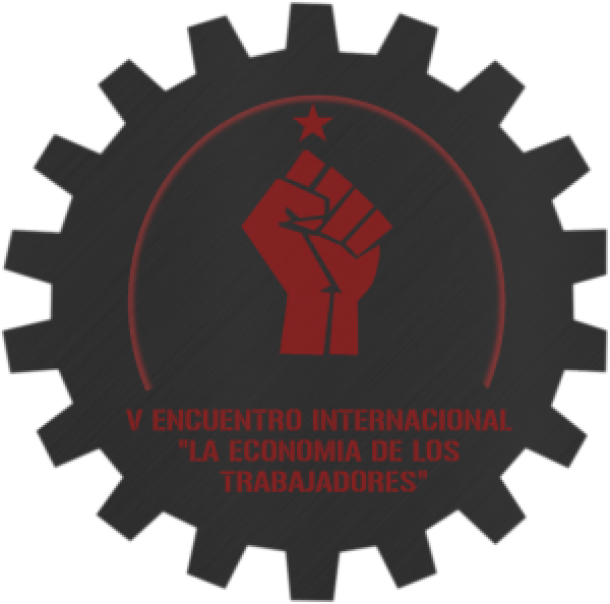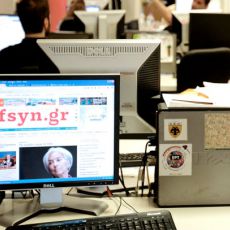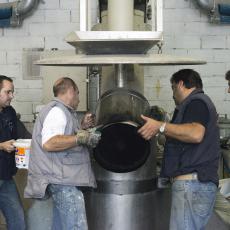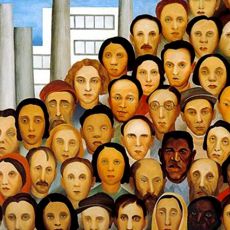Vth International Gathering “The Workers’ Economy”
Punta Cardón, State of Falcón, Península de Paraguaná, Venezuela July 22-26, 2015
Call for Participation
I. Background
Since 2007, the International Gathering of “The Workers’ Economy” (Encuentro Internacional de “La Economía de los Trabajadores-Trabajadoras”) has taken place every two years. The gatherings have opened up a space for debate and dialogue between workers, social and political activists, academics, and intellectuals concerning the problems and potential of what we have termed “the workers’ economy”—based on self-management and the defence of the rights and interests of the population that lives by their work, within the rubric of today’s conjuncture of global neoliberal capitalism. What has inspired and guided the debates and discussions of these past encuentros (gatherings) were the experiments of self-management forged by the people of South America, such as: the worker-recuperated enterprises of Argentina, Uruguay, and Brazil; worker cooperative movements; experiences in workers’ control and co-management in Bolivarian Venezuela; and the social and solidarity economy. These encuentros have been spaces where an increasingly necessary discussion—of the old and new problems faced by the working class and updated for our times of global neoliberal hegemony—is being revived and reconstituted.
So far, four International Gathering have taken place, including the participation of people from 30 countries from the Americas, Europe, Africa and Oceania: Buenos Aires (2007 and 2009), Mexico City (2011) and João Pessoa, Brazil (2013). In this last meeting it was collectively decided that the next International Gathering of “The Workers’ Economy” will be held July 2015 in Venezuela (Punta Cardón, State of Falcón, Paraguaná Peninsula). It was also decided in the Brazil encuentro in 2013 that regional gatherings of “The Workers’ Economy” would also be held in intervening years. With great success, the first of these regional gatherings have already taken place. The first was held in Europe in the French worker-recuperated factory Fralib (Gémenos, Marseille) between January 31-February 1, 2014. Later on in 2014, the South American Regional Gathering was held between October 3-4 in the Argentine recuperated factory Textiles Pigüé, which meant the return of these debates to Argentina where “The Workers’ Economy” gatherings had their start. And the last of the regional gatherings—encompassing North and Central America and the Caribbean—took place between November 6-8 in Mexico City at the Universidad Obrera de México (Workers’ University of Mexico), held in the midst of the massive popular mobilizations and the terrible moments that the Mexican people have been experiencing recently. At the Mexico City regional encuentro, a collaborative declaration of solidarity was written denouncing and critically clarifying the disappearance of the Ayotzinapa student teachers. Thus, the Gatherings of "The Workers’ Economy" are not just spaces for debate, but an international collective committed the struggles of the working class and peoples of the world.
II. Rationale
In the countries of the so-called “Third World,” especially in Latin America, broad social movements, workers’ movements, and grassroots organizations have been developing bottom-up processes of organization. In many cases, these experiments have expressed themselves as the self-management of productive entities or services, including worker-recuperated firms and other forms of co-management, workers' control, and the self-management of labor, both urban and rural. In some cases, these popular movements have gained influence at the government level, as witnessed in several South American countries today. This has placed on the table the question of the role of states as potential supporters of these processes while disputing the role of traditional apparatuses of power, putting into discussion once again the relationship between state power and the autonomy of popular movements.
The Gathering of “The Workers’ Economy” seeks to debate these and other questions as they relate the struggle of workers, bringing these questions to light within different perspectives and national, regional and international contexts. It aims to do this by bringing together academics committed to these struggles with workers and social activists. “The Workers’ Economy” gatherings are also spaces for dialogue and debate that have been inspired by and have had as their starting point the experiences of workers’ self-management. Worker-recuperated enterprises, self-managed workers, cooperatives, union-based labor movements, rural workers, social movements, political movements, and intellectuals, among others, with representatives from more than 30 countries, have been developing these encuentros over successive editions of “The Workers’ Economy.”
We reiterate here what we emphasized in previous encuentros: “While perhaps in uneven (yet non-hegemonic) ways, the different sectors and expressions of an increasingly diverse working class are already inventing alternatives that are not limited to the economic sphere. These alternatives overlap into wider cultural processes that, based on non-capitalist relations, offer glimpses of prefigurative spaces where internal relations of power and gendered structures, as well as the relationship between workers and the wider community, can once again be debated and discussed. These processes, visible for example in worker-recuperated factories and nascent forms of self-managed spaces, show that all workers—women and men—can, from out of conscientious planning, present to humanity an alternative model to capitalism.”
The proposal of the International Gathering of "The Workers’ Economy” is thus to develop a rationale based on the experiences of the working class, both in the critique of and resistance to the capitalist management of the economy, as well as in shaping their own forms of organization. It is with these priorities top of mind that we present this call for participation to the Vth International Gathering in Venezuela, which has been spearheaded by the initiative of the Socialist Council of Workers of VTELCA and from a broader group of organizations of the Venezuelan working class. Since 2011, workers of the Paraguaná Free Zone “Donato Carmona” have also been articulating a set of actions that have been bringing to the surface the contradictions of the global capitalist system. They have been taking up their historical working class role by forming in Venezuela a national movement for workers' control and Socialist Councils of Workers. Both the VTELCA workers and the Paraguaná Free Zone “Donato Carmona” are the main conveners and organizers of the International Gathering of "The Workers’ Economy.”
III. Thematic Areas
The Vth International Gathering of the Workers’ Economy in Venezuela will be organized into “ideas production panels” based on, but certainly not limited to, the following areas:
- Global crisis and Latin American capitalism: analysis and responses from the workers’ economy.
- Debates on self-management, co-management, workers' control, cooperatives, social production enterprises, and other ways of building the economy by workers.
- Issues in and problems for constructing a political economy of labor: management, production and integration of production, technology, the legal situation, etc.
- Poder popular (popular power), comunas (communes), social property, and territory.
- The role of the working class in the transformation of the state.
- Challenges of unionism and other forms of organizing workers within global neoliberal capitalism.
- Precarious, informal, and servile/indentured work: social exclusion or reworking of forms of labor in global capitalism?
- Building an education system for workers’ participatory, protagonistic, and democratic self-management.
IV. Methodology and Structure of the Gathering
Throughout the various International and Regional Gatherings of “The Workers’ Economy,” we have developed a methodology for debate and dialogue that aims to facilitate full participation and deep discussion of the thematic areas. The thematic areas have been developed to organize the debate rather than limit the discussion to these themes. Given the variety of participants—workers, social movement protagonists, and academics—we include three types of panels for discussion, in addition to ample spaces for related cultural activities:
1. Expository panels: These are panels with participants presenting papers that are selected and organized according to the Gathering’s main thematic areas. They will involve a combination of national and international presenters, and manual and intellectual workers, as appropriate. The expository panels serve as triggers to debate. At each of the expository panels there will be time for presentations and for questions or statements from those in attendence. The expository panels, as key spaces, will not overlap with other activities.
2. Roundtables (working panels): Roundtables (or working panels) are organized by themes and will run concurrently. They will combine paper presentations and presentations by workers about their experiences (workers will not be required to submit written papers but rather a brief summary of content). In addition, there will be workshops and discussion groups on specific topics proposed by one of the participating organizations or the organizing committee.
3. Working commissions: These are open spaces without predetermined presenters in order to openly discuss the various themes emerging in the Gathering. Working commissions will be led and inspired by the content presented in the expository and working panels.
V. Deadlines:
1. Deadline for submission of abstracts (250 words): May 15, 2015
2. Deadline for submission of full papers and proposals from social groups and workers: June 27, 2015.
3. The presentations can be submitted in English, Spanish, French or Portuguese. They must be submitted in Word or .odt format, in Times New Roman 12 point font, 1.5 spaces, up to a maximum of 15 pages.
4. The meeting is free and open to all, with registration to be made by submitting details to the organizing committee (to be announced).
5. Further information about travel (such as required visas), how to get to the encuentro, lodging, and registraton will be provided soon.
VI. Location of the Vth International Gathering of “The Workers’ Economy”
The Vth International Gathering of “The Workers’ Economy” will take place in Punto Fijo, Paraguaná, Estado (State of) Falcón. It will take place in the Zona Franca Industrial (Free Industrial Zone) Paraguaná “Donato Carmona”, Estado Falcón, República Bolivariana de Venezuela.
VII. Organizing Committee in Venezuela
In Punto Fijo, Venezuela
Consejo Socialista de Trabajadores y Trabajadoras of the factory Venezolana de Telecomunicaciones (VTELCA) and of the factories VIT, Vietven, CIT y ONFIPCA.
Coordination of the Vth International Gathering of “The Workers’ Economy” (2015) in Venezuela-Falcón-Península de Paraguaná:
- Franklin Medina, worker of the Universidad Bolivariana de Venezuela. Teléfono 04146968644, correo electrónico franklinmedina45@gmail.com
- Maximiliano Zapata, worker of Venezolana de Telecomunicaciones C.A. Teléfono 04266691827, correo electrónico maxzm7@gmail.com
- Oscar E Galicia, worker of Venezolana de Telecomunicaciones C.A. Teléfono 04265644050, correo electrónico galicia.vtelca@gmail.com
- Oscar J Galicia, worker of Venezolana de Telecomunicaciones C.A. Teléfono 04265642887, correo electrónico zamarrojesus@gmail.com
- Jaime Corena, worker of Corpivensa. Teléfono 04168649255, correo electrónico salomonxyz1952@gmail.com
Co-organizing Committee in Venezuela
- Movimiento Nacional por el Control Obrero.
- Frente Nacional de Lucha de la Clase Trabajadora.
- Juventud Venezolana por la Industrialización Socialista JUVINDUS.
- Movimiento Gayones.
- Escuela coriana socialista de trabajadores y trabajadoras (Edo. Falcón).
- MEGUN/Movimiento Estudiantil Gente Unexpo (Edo. Miranda).
International Organizing Committee
- Programa Facultad Abierta. SEUBE, Facultad de Filosofía y Letras de la Universidad de Buenos Aires, Argentina.
- Cooperativa Textiles Pigüé, Argentina.
- INCUBES-Universidade Federal da Paraíba, Brasil.
- Área de Estudios del Trabajo del Departamento de Relaciones Sociales de la Universidad Autónoma Metropolitana-Xochimilco, México.
- Núcleo de Solidariedade Técnica (SOLTEC), UFRJ, Brasil.
- Programa Procesos de reconfiguración estatal, resistencia social y construcción de hegemonías, Instituto de Ciencias Antropologicas, FFyL, UBA.
- Unidad de Extensión, Facultad de Cs. Sociales, Universidad de la República, Uruguay.
- Carrera de Relaciones del Trabajo, Universidad Nacional Arturo Jauretche (UNAJ), Argentina
- Asociación Autogestión (France)
- The Workerscontrol.net network (international)
- Officine Zero y Ri-Maflow, worker-recuperated enterprises (Italy)
- Centro para la Justicia Global (México/United States)
- ICEA (Instituto de Ciencias Económicas y Autogestión, Spain)
- Centre for Learning, Social Economy & Work (CLSEW), University of Toronto, Canada
- Casa de los Trabajadores, Córdoba, Argentina.
- Foro Joven (Colombia)
- Trabajadores de la fábrica Vio.Me (Tesalónica, Grecia)
- Programa de Antropología e Historia de la Relación Capital-Trabajo en el contexto contemporáneo, Universidad Nacional de Córdoba, Argentina.
Contacts for International Organizing Committee
Andrés Ruggeri (Programa Facultad Abierta, UBA, Argentina): andres.ruggeri@gmail.com
For communication in the following languages:
Portuguese: Flávio Chedid Henriques (SOLTEC, UFRJ, Brasil): flaviochedid@gmail.com
English: Marcelo Vieta (University of Toronto, Canadá): marcelo.vieta@utoronto.ca
French: Richard Neuville (Asociation pour l’Autogestion, Francia): neuville.richard@wanadoo.fr
Information, registration, and sending of proposals:





